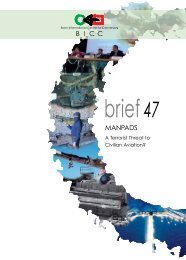egypt-final-presidential-elections-2012
egypt-final-presidential-elections-2012
egypt-final-presidential-elections-2012
You also want an ePaper? Increase the reach of your titles
YUMPU automatically turns print PDFs into web optimized ePapers that Google loves.
The Carter Center<br />
Presidential Election in Egypt<br />
which the SCAF and other parties might object to<br />
the draft text of the new constitution. 22 Finally, it<br />
set a new timetable for the transition that included<br />
the drafting of a new constitution, a referendum, and<br />
future <strong>elections</strong>. 23 See Appendix H for the full text of<br />
the SCAF’s June 17 Addendum to the Constitutional<br />
Declaration.<br />
The addendum was generally rejected by political<br />
forces, first and foremost among them the Muslim<br />
Brotherhood, which argued the SCAF had no<br />
authority to put forward what was, in effect, a new<br />
interim constitution. Many described the move as a<br />
“constitutional coup,” and widespread protests ensued.<br />
Amid the divisive political atmosphere and the delay<br />
in announcing the official results of the second round<br />
of the election, widespread protests ensued. On the<br />
other hand, some Egyptians were happy to see the<br />
dissolution of an Islamist-dominated Parliament,<br />
feeling more secure with an SCAF-led transition than<br />
one led by an Islamist president.<br />
Ambiguity in the amended constitution also posed<br />
many challenges for the future president who might<br />
not wield any real power. Effectively, the new president<br />
would be sharing power with the unelected military<br />
council for which there were no accountability<br />
mechanisms. Altogether, these events and decisions<br />
accumulated to undermine public confidence in the<br />
transition process. Having already held the <strong>presidential</strong><br />
election in which the powers of the office of the<br />
president were ill-defined, the SCAF’s redefinition of<br />
that power just as the polling stations closed added<br />
to the legal, constitutional, and political confusion in<br />
which Egypt was already mired.<br />
On June 24, one week after the conclusion<br />
of voting, Farouk Sultan, chairman of the PEC,<br />
announced the results of the election. After he<br />
outlined the resolutions to the various complaints<br />
that delayed the release of the <strong>final</strong> results, Sultan<br />
announced that Morsi was the new president of<br />
Egypt, having won 51.73 percent of the vote to<br />
Shafiq’s 48.27 percent.<br />
22 Id., Articles 60B and 60B1<br />
23 Id., Article 60B<br />
13



